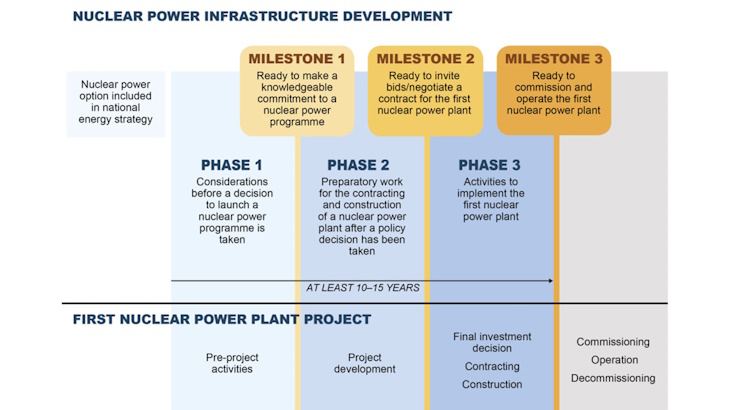The International Atomic Energy Agency (IAEA) has updated its Milestones Approach to include considerations for the deployment of small modular reactors (SMRs).
The Milestones Approach is a phased approach that guides countries through the process of planning, constructing, operating, and decommissioning their first nuclear power plant.
Updated Guidance for Nuclear Power Programs
The updated “Milestones in the Development of a National Infrastructure for Nuclear Power” now includes an annex outlining specific aspects of SMR deployment.
It also highlights the experiences of various countries that have made significant progress or completed all three phases with other reactor types using the Milestones Approach.
The Role of SMRs in Achieving Net-Zero
The IAEA emphasizes the need for a substantial increase in nuclear power deployments to achieve global net-zero carbon goals by 2050.
While large water-cooled reactors are expected to contribute the most to this new capacity, SMRs are recognized for their potential to play a crucial role.
Their smaller size, typically less than 300 MWe, makes them suitable for remote areas and regions with smaller electric grids.
Additionally, their modular design with factory-assembled components could lead to faster construction and deployment.
SMRs are also attractive for new end-users such as data centers and for decarbonizing industrial applications.
Unique Features of SMRs
While SMRs share similarities with larger reactors and traditional power plants, requiring robust legal and regulatory frameworks, stakeholder engagement, and environmental considerations, their unique characteristics, like lower power output and simplified designs, lead to some variations in infrastructure requirements.
Specific Infrastructure Considerations for SMRs
Certain types of SMRs, especially those using non-water coolants, may generate new forms of radioactive waste, requiring countries to plan for proper management.
New fuel types necessitate the establishment of a reliable supply chain, and new safeguards approaches may be needed to address novel SMR design features.
SMR Adoption in Newcomer Countries
According to the IAEA, there are approximately 30 newcomer countries either exploring nuclear power or advancing plans for their first nuclear power plant.
SMRs are currently under construction in Argentina, China, and Russia. Several newcomer countries, including Estonia, Jordan, and Poland, have also identified SMRs as part of their future clean energy plans.
The IAEA has provided support through initiatives like the Integrated Nuclear Infrastructure Review (INIR) mission focused on SMRs in Estonia and consultations with Jordan regarding the use of SMRs for seawater desalination.
The Milestones Approach: A Phased Approach
The Milestones Approach is a comprehensive method to assist countries in establishing the necessary infrastructure for a nuclear power program, whether they are considering their first nuclear power plant or expanding an existing one.

The approach divides the process into three phases, each with a milestone indicating a country’s readiness to progress to the next phase.
The United Arab Emirates, which connected its first nuclear unit to the grid in 2020, exemplifies a country that has successfully followed the Milestones Approach.
Second Revision and Future Outlook
This marks the second revision of the IAEA’s guidance, which was first published in 2015. It incorporates lessons learned from recent INIR missions.
Aline des Cloizeaux, Director of the IAEA’s Division of Nuclear Power, acknowledged the evolving nuclear power landscape and the increasing interest in nuclear power for clean energy transitions.
She stressed the importance of ensuring that countries interested in SMR technology have a solid foundation for successful implementation.
Upcoming Conference on SMRs
The IAEA will be hosting the first International Conference on Small Modular Reactors and their Applications from October 21st to 25th in Vienna.